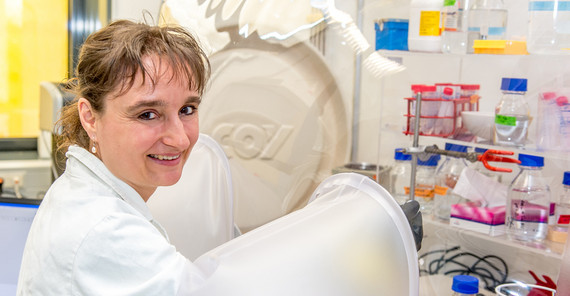The strong presence of German working groups at international meetings on enzymes with metal centers gave Silke Leimkühler the idea to develop a priority research area. The Professor of Molecular Enzymology thought it was time to submit a research proposal to the German Research Foundation (DFG), which focuses on a range of topics combining the work of the researchers involved: All enzyme systems have iron-sulfur clusters. There are unanswered questions regarding the structure and function of specific metal-containing enzymes, which are responsible for important metabolic functions in all living organisms. Without them, life would be impossible.
Success was not long in coming. In early 2016, the DFG chose new priority programs out of the 87 concepts submitted – among them was “Iron-Sulfur for Life”. Like all DFG priority programs, “no life without iron and sulfur” excels in its interdisciplinarity and novel methods. A special characteristic is the nationwide cooperation of researchers from various disciplines: chemists, biochemists, biologists, microbiologists, and spectroscopists. 27 groups from universities such as Freiburg, Marburg, Göttingen, Braunschweig, Kaiserslautern, Halle, Greifswald, Cologne, Bayreuth, Potsdam, Leipzig, Berlin, and from two Max Planck institutes are participating in the new priority program.
Iron-sulfur clusters are vital for plants, animals, and humans
Within the new project, the participating groups are investigating the influence of iron-sulfur clusters on enzyme activities at the cellular level. These clusters consist of iron and sulfur, which are cofactors in enzyme reactions. Preliminary experiments confirmed that the metal compound is an important prerequisite for the synthesis and function of metabolic pathways in the cell. “The iron-sulfur clusters developed very early in evolution and have a key function in breathing, photosynthesis, and the metabolism of nitrogen, carbon, and sulfur compounds in the cell as well as in hydrogen production,” says Prof. Leimkühler. These enzymes are vital for plants, animals, and humans. In the future, they might even play a decisive role in generating energy. In addition to nitrogen, they also convert hydrogen, another potential future energy source. The research may also provide insight into possible biotechnological applications of the molecules. “Initially, however, we have to find out how these enzymes are built, the role of the metals, and how they affect protein activity,” Leimkühler explains. The synthetic pathways for enzymes are very complex systems. “We are trying to find the common denominator; one aim is identify the similarities for the biosynthesis of complex metal-containing cofactors,” she says. The researchers’ ultimate goal is to understand how biosynthetic pathways influence each other at the cellular level.
The research is predominantly done in the lab and includes various methods such as protein purification and crystallization. “We want to investigate the whole cell, i.e. changes in one pathway affect another.” Understanding the system, the biosystem pathways, is, therefore of essential importance. The researchers use special methods to visualize the processes. Cellular interactions can be made visible, by, for example, fluorescence marking. Spectroscopy of the cell is now also possible. Other groups focus on theoretical aspects and work mainly on the computer.
Although the project is fundamental research, it repeatedly also raises application aspects, for example, in those subprojects that help understand pathogenesis resulting from iron deficiency or excess. Since various biosynthesis pathways interact, iron cannot be considered in isolation. The researchers are, therefore, investigating molybdenum, a so-called transition metal that is also essential for humans.
Prof. Leimkühler is the coordinator of the cluster and is, therefore, responsible for keeping the project running – hardly a side job. In cooperation with the other participants, she communicates with the DFG, organizes meetings, and ensures renewal proposals are written and ideas developed. Twice a year, the researchers meet to present and discuss their results. She also organizes an international summer school. Promoting young researchers is very important to her. She wants to inspire interest in her topic among young people and ideally integrate them during the project.
The Researcher
Prof. Silke Leimkühler studied biology at Bielefeld University. Since 2009, she has been Professor of Molecular Enzymology at the University of Potsdam.
Universität Potsdam
Institut für Biochemie und Biologie
Karl-Liebknecht-Str. 24–25, 14476 Potsdam
sleimuuni-potsdampde
The Project
Priority Program Iron-Sulfur for Life (SPP 1927)
Coordination: Prof. Silke Leimkühler,Institute of Biochemistry and Biology
Duration: since 2016
Funding: German Research Association (DFG)
Text: Dr. Barbara Eckardt
Translation: Susanne Voigt
Online published by: Daniela Großmann
Contact us: onlineredaktionuuni-potsdampde

